Inflation rate in
Eastern Visayas declines to 1.6% in May 2019
By
PSA-8
June 19, 2019
TACLOBAN CITY – The
Inflation Rate (IR) in Eastern Visayas continued to drop to 1.6
percent in May 2019. This is 0.4 percentage point lower compared
with the 2.0 percent IR a month ago, and 4.2 percentage points lower
compared with the 5.8 percent IR recorded in the same period last
year. The regional inflation rate is 1.6 percentage points lower
than the 3.2 percent national average in May 2019.
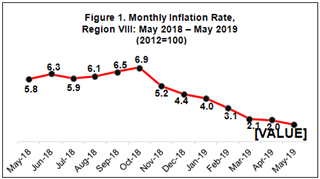 The provinces of Biliran,
Eastern Samar, Northern Samar and Samar registered lower IRs in May
2019 compared with their figures in the previous month. Samar
recorded the biggest drop of 1.5 percentage points, from 1.3 percent
in April 2019 to -0.2 percent in May 2019. On the other hand, 0.3
percentage point and 0.2 percentage point increases in IRs were
noted in Leyte and Southern Leyte, registering 3.8 percent and 2.2
percent, respectively in May 2019. Biliran posted the lowest with
negative IR at 2.9 percent, while Leyte recorded the highest IR
during the month in review at 3.8 percent (Table 1).
The provinces of Biliran,
Eastern Samar, Northern Samar and Samar registered lower IRs in May
2019 compared with their figures in the previous month. Samar
recorded the biggest drop of 1.5 percentage points, from 1.3 percent
in April 2019 to -0.2 percent in May 2019. On the other hand, 0.3
percentage point and 0.2 percentage point increases in IRs were
noted in Leyte and Southern Leyte, registering 3.8 percent and 2.2
percent, respectively in May 2019. Biliran posted the lowest with
negative IR at 2.9 percent, while Leyte recorded the highest IR
during the month in review at 3.8 percent (Table 1).
Among the commodity
groups, housing, water, electricity, gas and other fuels commodity
group registered the biggest drop of 1.3 percentage points, from 0.2
percent in April 2019 to -1.1 percent during the month in review.
The heavily weighted food
and non-alcoholic beverages declined by 0.2 percentage point to 2.3
percent in May 2019 from its previous month’s rate of 2.5 percent.
Higher inflation rates noted in fish; sugar, jam, honey, chocolate
and confectionery products; corn; vegetables; oils and fats; and
milk, cheese and eggs were offset by slower price increases in rice;
non–alcoholic beverages; bread and cereals; fruits; meat; and food
products not elsewhere classified. Rice registered the highest
decrease of 1.5 percentage points, from 0.2 percent in April 2019 to
-1.3 percent in May 2019. Fruits index continued to register a
negative inflation rate at 5.7 percent.
Slower IRs were also
exhibited in the commodity groups of alcoholic beverages and
tobacco; clothing and footwear; furnishings, household equipment and
routine maintenance of the house; and communication.
On the other hand,
transport IR increased to 5.9 percent during the reference month,
0.4 percentage point higher compared with the 5.5 percent IR in
April 2019. This can be traced to higher IRs in the index for
transport services.
IR for the commodity
groups of health and recreation and culture increased by 0.1
percentage point each, both settling at 3.6 percent, during the
month in review.
Restaurant and
miscellaneous goods and services and education, meanwhile, retained
their previous month’s rates of 2.3 percent, -16.4 percent,
respectively.
The Purchasing Power of
Peso (PPP) of the region remained at P0.80 in May 2019. This PPP
implies that goods and services worth 100 pesos in May 2019 only
cost 80 pesos in 2012.
All provinces retained
their previous month’s PPP, except for Samar, which posted a 0.01
centavo increase in PPP. Biliran recorded the strongest PPP at
P0.84. Southern Leyte ranked second at P0.82, followed by Leyte at
P0.81, Eastern Samar at P0.79, and Samar at P0.77. Northern Samar
posted the weakest PPP at P0.76.
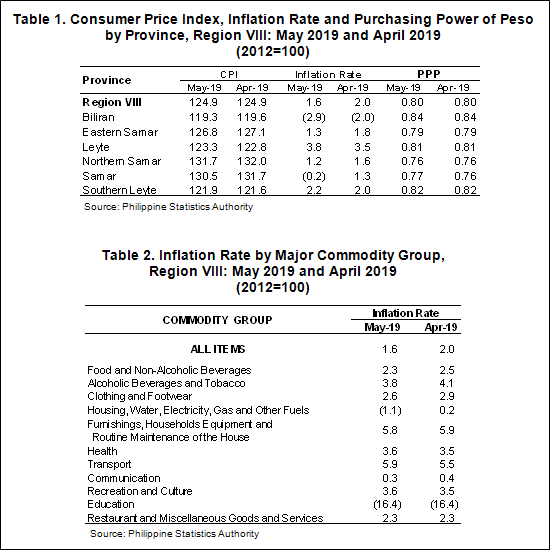
|
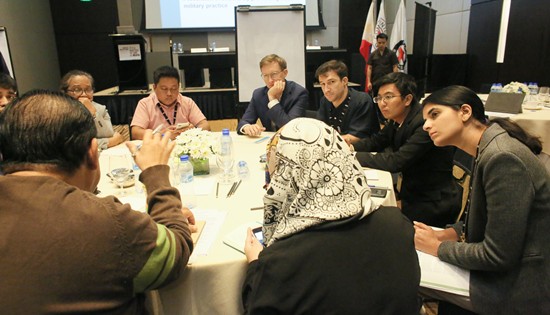
Participants
share their experiences and recommendations on issues of
concern during the Health Care In Danger (HCID) Asia-Pacific
regional meeting at New World Makati Hotel in Makati City,
Philippines. |
Working together
to protect health care across Asia-Pacific
By
ICRC
June 18, 2019
MANILA –
Representatives of health ministries, medical associations,
academia, military and aid organizations from nine countries have
committed to work on ensuring that health care is safe from
disruption and violence in the Asia-Pacific region, affirming there
is an urgent need to strengthen the preparedness of health-care
systems in this regard.
The first regional
meeting, held in Makati City from June 13 to 15, gathered 65
participants who reaffirmed their collective responsibility in a
declaration to enhance the protection of health-care services from
various forms of violence. While the process needs to be led by
States, there are many opportunities for other stakeholders to
contribute to the effort.
“Every day, medical
personnel, nurses and health responders are confronted with
situations of violence and other actions that disrupt provision of
health care to those who need it the most,” said Maciej Polkowski,
head of the Health Care in Danger (HCiD) initiative at International
Committee of the Red Cross (ICRC). “This can range from deliberate
attacks in cases of conflict, to violent verbal abuse from a
patient. These regional meetings concentrate on the ground realities
in Asia-Pacific and are aimed at moving towards improved protection
of health care in a very concrete, defined and hopefully, inspiring
manner.”
The HCiD initiative was
launched globally in 2011 by the ICRC and the International Red
Cross and Red Crescent Movement to improve the protection of health
care. It is a multifaceted initiative that encompasses partnerships,
advocacy and an operational approach. The recent Asia-Pacific
meeting was organized by the ICRC in partnership with the Philippine
Red Cross. It brought together participants from Afghanistan,
Australia, Bangladesh, Indonesia, Japan, Myanmar, Pakistan, Papua
New Guinea and the Philippines.
In the meeting, the
participants discussed and shared concrete experiences in the task
of making health-care services accessible, safe and free from
violence. By adopting the “Manila Declaration on the Protection of
Health Care,” they agreed that:
- Weapon bearers must
strengthen their respect for safe and secure delivery of health care
through practical measures such as training manuals and standard
operating procedures;
- Authorities must
undertake appropriate measures to train and educate civil servants,
health-care workers and the public on domestic laws protecting
health care;
- There is a need to
strengthen the resilience and preparedness of health-care systems to
face attacks, with focus on the physical security of facilities,
training of staff to prevent and manage violence and to strengthen
coordination mechanisms.
For the meeting’s host
country – the Philippines – protection of health care is highly
relevant in the southern island of Mindanao due to decades of
internal armed conflicts that presented various challenges for
health professionals.
“We have to be concerned
with the safety and protection of health-care workers deployed in
areas affected by conflict as these are the places we also cater
to,” said Dr Rolanisah Dipatuan-Dimaporo, chief of staff in the
ministry of health of the Bangsamoro Autonomous Region of Muslim
Mindanao (BARMM). “But we also realized during the meeting that
health staff in contexts other than conflict are exposed to
different risks.”
Moving forward,
participants of the Asia-Pacific meeting agreed that by supporting
the declaration, they commit to consolidate the good intentions and
ideas into action by discussing and incorporating HCiD initiatives
in their respective agencies’ strategic planning.
The ICRC is a neutral,
impartial and independent organization whose exclusively
humanitarian mission is to protect the lives and dignity of victims
of armed conflict and other situations of violence and to provide
them with assistance. It has an international mandate to promote
knowledge for and compliance with international humanitarian law.
|
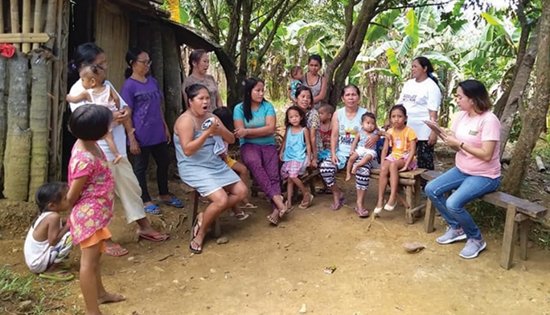
PNC
Jennibeth S. Canete (right) together with Janice Bael
conduct interview with ECCD F1K beneficiaries during an
R-TAME team monitoring/evaluation of the village of
Buenavista, Baybay City. |
ECCD-IP
implementation in ASAPP areas evaluated
By
JACK C. GADAINGAN,
Nation Builder
June 17, 2019
TACLOBAN CITY – In
three years of its implementation, the Early Childhood Care and
Development - Intervention Package (ECCD-IP) for First 1000 Days
(F1K), has really made some impact in the nutritional status of
local people in the pilot area.
ECCD program coordinator
Jennibeth S. Cañete, who headed the Regional Technical Assistance
Monitoring and Evaluation (R-TAME) team, disclosed this in an
exclusive interview with Nation Builder.
An R-TAME team composed of
Cañete and Janice Bael of National Nutrition Council Region 8
(NNC-8) together with Saloma Guisulga, Elena Monteroso and Melodina
Edullantes of the Visayas State University - Barangay Integrated
Development Approach for Nutrition Improvement (VSU-BIDANI),
conducted a monitoring and evaluation of the ECCD F1K
implementation, down barangay level in the city of Baybay and the
towns of Abuyog, Mahaplag and Hilongos all in Leyte 5th district on
May 28-31, 2019.
“There has been a
significant decrease of malnutrition in this city since the
implementation of the Early Childhood Care and Development!” Baybay
City Mayor Carmen L. Cari claimed in a State of Nutrition Address (SONA)
on October 24, 2018.
The local government units
(LGUs) of Abuyog, Mahaplag, Hilongos and Baybay are covered under
the Accelerated and Sustainable Anti-Poverty Program (ASAPP) of the
national government, a three-year intervention package being piloted
in selected cities and municipalities (10 provinces nationwide)
considered poor.
Health and nutrition is
only one component of ASAPP, which aims to accelerate poverty
reduction and boosting economic growth in the identified localities
through public-private interventions, among which by tapping the
skills and resources of the poor in enabling private enterprises to
expand their production capacities and markets.
Meanwhile, focus on First
1000 Days congruent with the Early Years Act (RA 10410) refers to
full range of health, nutrition, early education, and social
services development program for the holistic needs of young
children. It further narrows down the age-group on First 1000 Days
of life, referred as “golden window of opportunity” for the child’s
growth and development--that includes the time of conception
(pregnancy), until the baby is born and two years of age.
The primary and immediate
objective of ECCD-IP F1K is to reduce maternal and child
undernutrition, specifically at normal times: a. Promote optimum
infant and young child feeding; b. Nutrition services in ante-natal
care; c. Health services (prenatal, prenatal, immunization,
management of childhood illnesses, reproductive health).
In emergencies: d. Vitamin
A, iron, and iodine supplementation; e. Food fortification with
vitamin A, iron, and iodine; f. Diet diversification; Increase food
supply and improve physical and economic access to nutritious and
safe food; and g. Early child learning and psychosocial stimulation.
|
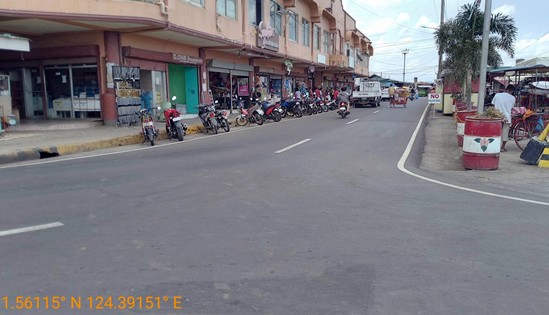
Completed
access road project leading to Naval Port amounting to
P37.13M. Application of asphalt overlay with thermoplastic
pavement is also included in the scope of work. |
Rehabilitation of
access road leading to Naval port completed
By
DPWH-Biliran
June 17, 2019
NAVAL, Biliran – An
access road leading to Naval seaport has been improved by the
Department of Public Works and Highways (DPWH) -Biliran District
Engineering Office (DEO).
From a bumpy and narrow
existing concrete road, travellers along Vicentillo Extension to
Naval port is experiencing a great difference of travel with the
completion of DPWH-Biliran DEO access road project.
Mr. David Julian Culibra,
who frequently pass along this road section in going home said that
he now enjoys riding his motorcycle along this road.
Before the rehabilitation
project of DPWH, the road along this section had intermittent big
potholes, posing danger to the travelling public.
“The existing substandard
concrete road shows rutting and depressions and it was difficult to
drive because the road is uneven,” explained Culibra.
In convergence with the
DPWH and the Department of Transportation (DOTr), DPWH-Biliran DEO
has included the rehabilitation of this project under its 2017
Regular Infrastructure Program with a contract cost of P37.13M.
According to District
Engineer David P. Adongay Jr., the project was prioritized because
of the traffic congestion along this route during peak hours due to
its damaged surface.
The said project involves
the rehabilitation of damaged substandard local road with a width of
6.10-meter and a thickness of 0.23-meter and with a length of
1.390-kilometer two lane road. It also involves a construction of
754-meter length of drainage canal and payment of Road-Right-Of-Way
(RROW). Application of asphalt overlay with thermoplastic pavement
is also included in the scope of work.
At present, it has already
a smooth surface and is much safer for the traveling public.
“This is the kind of road
I like to travel every day,” said Culibra.
ACT on doubled
salary of teachers in 20 years: Cabinet member pay rose 5 folds
Press Release
June 16, 2019
QUEZON CITY – ACT
countered DepEd's claim that teachers are taken care of with the
doubling of their salaries in 2 decades by raising the fact that
salaries of cabinet members increased by 570% and the president’s
basic pay by 606% since 2000.
DepEd Sec. Briones
reportedly defended in a recent cabinet meeting that teachers are
taken care of by presenting historical data on teachers' salaries
and benefits.
“Sec. Briones forgot to
mention that in the same period, salaries of top government
officials increased 5 to 6 times. Now, whose welfare are truly taken
care of?” asked Joselyn Martinez, ACT National Chairperson.
ACT study on government
pay scheme since 2000 revealed that cabinet members pay rose from
P38,500 in 2000 to P257,809 in 2019 while the president's salary
increased from P55,000 in 2000 to P388,096 this year.
“Clearly the principle of
equitable and sustainable pay is not reflected in the government
salary scheme. The government is the foremost violator of the
constitutionally mandated principle of social justice as the gap
between rank-and file and top officials continue to widen, ' added
Martinez.
Nothing special in doubled
salaries in 20 years
Martinez lambasted DepEd
for ‘deliberately obscuring the entire picture’ when the agency
claimed that teachers’ salaries have doubled since 2000 while
failing to mention its context, and the fact that all other salaries
as well as the costs of living also rose to around the same rate.
“There is nothing special
with the doubling of salaries in the span of two decades. Salaries
of all workers have been chasing after the rising cost of living
through the years but never managed to keep up,” said Martinez.
ACT cited that the 119%
increase in teachers' pay since 2000 are approximately the same, if
not lower than those received by minimum wage earners in the public
and private sector.
The minimum wage in NCR
rose by 140%, from P223.5 in 2000 to P537 at present. Salary Grade I
government employees had 130% pay increase, from P4,821 to P11,068
this year.
Better benefits?
ACT also belied Sec.
Briones’ claim in ‘pushing for reforms and initiatives’ that
allegedly resulted in improved benefits, citing that benefits
received by teachers are largely the same as those received by other
government employees such as the 13th and 14thmonth pay, and their
clothing allowance.
The chalk allowance, ACT
said, is a special benefit for teachers for having the distinct
situation of needing to buy their own supplies needed in the
performance of their duty. ACT also raised that even the benefits
that are yet to be received by teachers such as the P500 medical
allowance and P1,000 World Teachers’ Day (WTD) bonus are already
mentioned by the secretary to make it appear that teachers are
better off than other government employees.
“The grant of medical
allowance is actually 50 years delayed since the 1966 Magna Carta
provided for it, and now it hangs by a thread as the president
placed it under conditional implementation. Even the WTD bonus is
P500 short of the P1,500 amount promised by Sec. Briones last year,”
Martinez explained.
The teachers’ federation
further argued that it was the ‘uncompromising pursuit for better
pay and benefits’ that gained teachers these rightful compensations.
“The government did not
give these benefits out of their own will, these are hard won by
teachers together with our partners in Congress, especially the ACT
Teachers Partylist,” said Martinez.
ACT detailed that the
increase in chalk allowance from P700 to its current amount of
P3,500 was campaigned by teachers inside and outside the parliament.
The same goes for the additional P2,000 in their uniform allowance
and the newly included P500 annual medical allowance for teachers.
These amendments were made possible by legislation principally
authored and pushed for by ACT Teachers Partylist. Even the official
celebration of World Teachers' Day (WTD) was a product of a law
passed by ACT Teachers Partylist, which allowed for DepEd's recent
move to provide a WTD bonus.
“The same resolve of
teachers and partners who recognize the value of education will also
win us our much-deserved salary increase,” declared Martinez.
‘Enough with the
propaganda’
ACT urged DepEd to stop
trying to ‘deodorize the government’ and instead work with teachers
in fulfilling the overdue pay hike promise.
“The propaganda has to
stop. More time should be spent on actually resolving the crisis in
the pay of teachers and other rank-and-file employees, instead of on
manipulating facts. Teachers are fighting for decent living and
working condition, heed us instead of delegitimizing our struggle,”
pressed Martinez.
Senior high
school in Leyte gets new classrooms
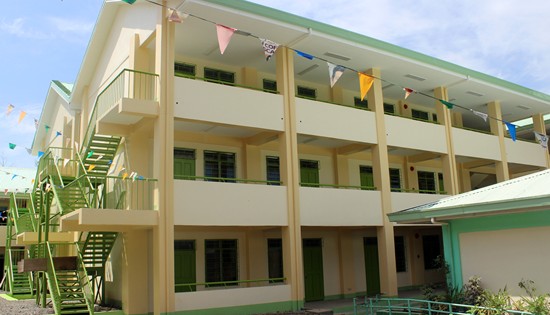
By
DPWH 2nd LED
June 11, 2019
JULITA, Leyte – The
Department of Public Works and Highways (DPWH) Leyte field office
here has recently completed the construction of a three-storey
six-classroom school building at Julita Senior High School in Julita,
Leyte.
According to Erlinda Daya,
school head, the new facility will be used as regular classrooms
while the old vacated buildings will be utilized as laboratories and
office for teachers. The school has a total of 308 enrollees for
this year.
The high-rise building is
worth P15 million funded under the Basic Educational Facilities Fund
(BEFF) of 2018. BEFF is an annual budget for school building
program, which covers the improvement and maintenance of school
facilities in the country.
“This building is provided
with standard toilet and sanitary facilities, storage rooms and
proper ventilation, each classroom installed with two oscillating
ceiling fans. It is also equipped with fire alarm system and fire
extinguisher,” said Gerald Pacanan, DPWH Leyte 2 district engineer.
He added that with the
addition of junior and senior high, the number of students in high
school has increased prompting the government to allocate more funds
for school facilities.
“This is in support to the
government’s strengthened education program. We, at the DPWH and in
coordination with the Department of Education commit to provide more
conducive learning facilities for students,” he ended.
For 2018 BEFF, the
district is tasked to implement 25 school building projects worth
P371.39 million.
Gift-Giving
activity of GMA Kapuso Foundation, Inc. in partnership with DepEd
and 14IB in Eastern Samar
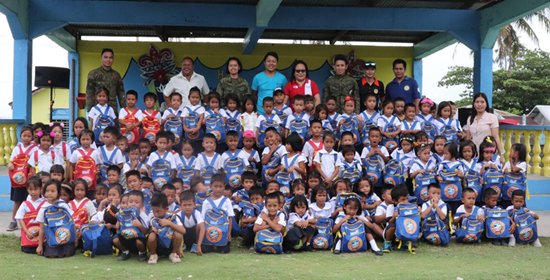
By
14th Infantry Battalion, 8ID PA
June 10, 2019
BRGY DAO, Oras, Eastern
Samar – The 14th Infantry (Avenger) Battalion, under the
leadership of its Commanding Officer, LTC Jasper Justito M. Pecson
INF (GSC) PA, Commanding Officer, participated in the conduct of
gift-giving activity of GMA Kapuso Foundation, Inc. with the theme
“Unang Hakbang sa Kinabukasan 2019” spearheaded by Ms Amabelle
Rusiana, Eastern Visayas coordinator of GMA Kapuso Foundation, Inc.
with the Department of Education (DepEd) Eastern Samar last June
4-8, 2019.
The four (4) day
gift-giving activity of foundation is composed of complete school
supplies with backpacks that were distributed to the kindergarten
and Grade I pupils in the different barangays of the Municipalities
of Dolores, San Policarpo and Arteche, all of Eastern Samar. About
3,300 children were benefited from the said activity.
The said gift giving
activity recognizes the burden of less fortunate families in
providing school supplies for their children. It also creates an
impact to the community in order for the people to support the
government’s mandate in sustaining the promotion of peace and
development of the community and at the same time to bring happiness
to the people, making them feel that they are not forgotten. It
further encourages the children to continue to go to school and
learn for a better future.
The unit expressed its
gratitude to the foundation in collaboration with the DepEd for the
successful conduct of the gift-giving activity, which contributed to
the sustainment of peace through the efforts of the different
stakeholders in the province of Eastern Samar.


DPWH-Biliran DEO
implements additional flood control projects under 2018 fund
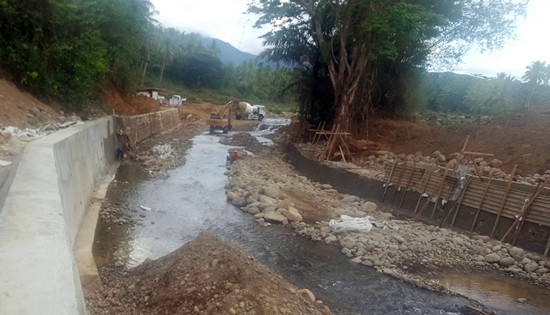
By
DPWH-Biliran
June 10, 2019
NAVAL, Biliran –
The Department of Public Works and Highways (DPWH)- Biliran District
Engineering Office (DEO) is implementing additional two flood
control projects under its 2018 fund. These flood control projects
are implemented at Brgy. Mapuyo in Kawayan town and Brgy. Busali in
Biliran town.
District Engineer David P.
Adongay Jr. said that these projects are currently on-going with an
accomplishment of 50% and 20%, respectively as of May 31, 2019.
“The funds for the
additional flood control projects are late release of the 2018
budget under the local infrastructure program, hence also the late
in implementation” said Adongay.
According to Adongay,
these flood control projects were prioritized to protect the
community and agricultural products against flooding and damages.
“There is an urgent need
for the completion of these projects especially that it is already
rainy season,” said Adongay.
The P9.63M construction of
Busali Flood control project entails the construction of a
156-linear meter length on both sides of the river with a height of
3.5-meter. This project is target to be completed on June 30, 2019.
Meanwhile, the Mapuyo
Flood Control project entails the construction and reconstruction of
revetment structure with a total length of 192-linear meter on both
sides and a height of 3.5-meter with a contract cost of P14.46M.
This project is set to be completed on September 23, 2019.
Adongay revealed that the
portion of the existing flood control structure in Mapuyo river was
damaged during tropical storm “Urduja” in December 2017 due to the
impact of the washed out debris, thus the need for a reconstruction
of a 65-linear meter length on one side of the river.
Adongay said that with the
additional project, Biliran DEO now has a total of 62 projects
implemented under 2018 fund from only 60 projects.
Out of the 62 projects, 52
were already completed while 10 are on-going with an overall
accomplishment of 91.97% as of May 31, 2019.
On-going projects includes
four access roads leading to tourist destinations, one slope
protection project, one bypass road, one bridge widening, one
multipurpose building and two flood control projects.
289 new Candidate
Soldiers took oath to serve the country
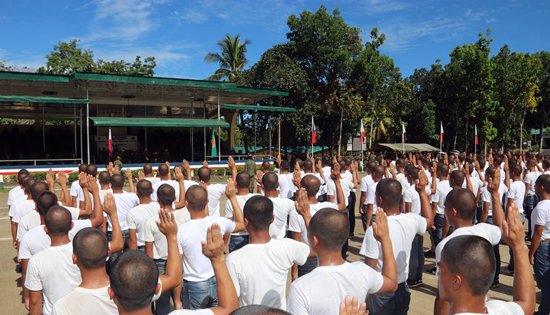
By
DPAO, 8ID PA
June 6, 2019
CAMP LUKBAN, Catbalogan,
Samar – A total of 289 new Candidate Soldiers of the Philippine
Army took their oath of duty and service to the country in a simple
ceremony held at the hallowed grounds of the Army’s 8th Infantry
Division Headquarters in Catbalogan City, Samar on Wednesday morning
June 5, 2019.
The oath taking rite was
immediately followed by the opening of the Philippine Army Candidate
Soldier Course Classes 583 & 603 -2019 by no less than Major General
Raul M Farnacio AFP, Commander of the 8ID in the presence of the
candidate soldiers’ love ones; and Officers, Enlisted Personnel and
civilian employees of the Stormtroopers Division.
The 4-month course is
expected to transform and mold the new recruits from being “boys”
into “men”. After completing and passing the rigid training, they
will be then enlisted into the Philippine Army with the rank of
Private.
Major General Farnacio in
his remarks assured the candidate soldiers’ parents that their sons,
after the training will be competent and disciplined soldiers. “’Ang
araw na ito ay hudyat ng malaking pagbabago sa inyong kinagisnang
buhay bilang sibilyan. Mula ngayon, sasanayin at tuturuan kayo ng
ibat-ibang kaalaman at kakayahan. Ang inyong pagsasanay ay hindi
magiging madali. Hindi lamang tatag ng katawan ang susubukin maging
ang tibay ng damdamin at bilis ng kaisipan din.”
“Bilang Division
Commander, aking inaasahan na kayo ay magiging mga sundalo na may
mataas na antas ng disiplina, buo ang paninindigan, matapang, at
tapat sa tungkulin na ngayon ay inyong sinumpaan”.
“Huwag ninyong bibiguin
ang inyong mga magulang at ang lahat ng taong nagtitiwala at
umaasang mapagtatagumpayan ninyo ang lahat ng hamon ng pagsasanay
upang kayo ay magiging ganap na sundalo. Wala ng atrasan! Gabayan
sana kayo ng Poong Maykapal,” Farnacio said.
The 298 candidate soldiers
came from different provinces all over the country with the
following education profile: 79 college graduates; 79 college level;
5 vocational graduates; 41 senior high school graduate and 85 high
school graduate with special skills from TESDA.
Save the Children
Philippines says children have a right to cleaner air
Press Release
June 5, 2019
MAKATI CITY – Save the
Children Philippines called for a clean and healthy environment in
schools and communities to protect children from diseases and
premature deaths due to air pollution.
The group raised the issue
at the World Environment Day on June 5, citing around seven million
people die every year across the world due to health problems caused
by air pollution, 600,000 of them are children.
Lawyer Albert Muyot, Chief
Executive Officer of Save the Children Philippines said learners
spend an average of five to eight hours in schools, facing health
risks from air pollution.
As classes opened last
Monday, majority of children will be in schools for five days and
will be exposed to air pollution and other health risks, said Muyot.
“Young learners have
fragile bodies and exposure to tiny, invisible airborne particles
from dirty air pose serious risks to their health,” said Muyot.
Save the Children’s End of
Childhood Report 2019 ranked the Philippines 104th in the 176 list
of best and worst countries to be a child due to high number of
teenage pregnancy, malnutrition and child deaths before reaching
five years old.
The report said
malnutrition among Filipino children remains high at 33.4 percent –
or 3.8m – children under five years not getting enough daily
nutrition. It added that nearly three percent – or 322,000 – of
children in the country die before their fifth birthday from
preventable causes.
“Millions of children who
lack daily nutrition are more susceptible to illnesses including
pneumonia, bronchitis and asthma due to air pollution and face the
risk of dropping out of schools,” said Muyot. These children also
face devastating and life-long health risks as air pollution can
affect the development of their lungs, brain and other organs, he
added.
Last year, the Philippines
recorded the 3rd highest number of deaths due to air pollution with
45.3 deaths per 100,000 individuals, next to China as first and
Mongolia as second. “Save the Children Philippines makes sure
children have a healthy start in life,” said Muyot.
It implements maternal and
child health and nutrition services for children and pregnant and
lactating mothers in deprived areas in the capital Manila and
conflict-affected areas in Mindanao to address malnutrition. To
prevent spread of diseases, the group provides clean water, hygiene
and sanitation programs in public schools in the most deprived areas
and during humanitarian response to natural disasters.